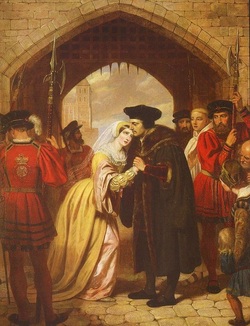
'We suggest that the fourteen days from June 21-the vigil of the
Feasts of St. John Fisher and St. Thomas More- to July 4,
Independence, Day, be dedicated to this “fortnight for freedom”-a
great hymn of prayer for our country. Our liturgical calendar
celebrates a series of great martyrs who remained faithful
in the face of persecution by political power-St. John Fisher and St.
Thomas More, St. John the Baptist, SS. Peter and Paul, and the
First Martyrs of the Church of Rome. Culminating on Independence
Day, this special period of prayer, study, catechesis, and public
action would emphasize both our Christian and American heritage of
liberty.'
The message that could be taken from this statement is the idea that these great saints and martyrs were honored by the Church for their support of the liberal [1] dogma of religious freedom. Yet nothing could be further from the truth. Take for example St. Thomas More.
During his time as Chancellor of England Thomas More supported the civil
laws against heresy. As the Catholic Encyclopedia article on Thomas More puts it:
‘He [Thomas More] agreed with the principle of the anti-heresy laws
and had no hesitation in enforcing them…… [F]our persons suffered
the supreme penalty for heresy during his whole term of office [as
Chancellor of England].’ [2]
Other’s may argue that More tolerated his future son-in-law’s-William Roper’s-support of Martin Luther. However, More’s tolerance of Roper’s Lutheranism were with the expectation that he would convert and furthermore More only permitted his daughter to marry him after he had renounced his heresy which he eventually did. [3]
More’s apparent support for the ideal of religious tolerance in his book Utopia was written during his younger years and nevertheless by the time he became Chancellor his views had changed. [4] Furthermore Thomas More did not choose martyrdom to defend the right to profess any religion or belief but to defend the freedom of the Church. His refusal to take the Oath stating that King Henry VIII of England was supreme head of the Church in England was based on the conviction that Christ had given leadership of the Church only to St. Peter and his successors. This refusal led to More being executed by the King’s men. When More mounted the scaffold to be executed his last words were that he would die “in the faith and for the faith of the Catholic Church, being the King’s good servant, but God’s first.” [5] A recent article in Columbia, the official magazine of the Knights of Columbus, stated it well:
‘The central truth that More defended-for which he later died-was
thus not a right to autonomous self-determination. It was, rather,
that the spiritual authority and rightful liberty of the Church were
given by God to be exercised by the bishops in union with the
pope. [6]’
Thus Thomas More was no ardent supporter of religious freedom. He was a supporter of the heresy laws against Protestantism and his martyrdom was done in support of the right of only the Catholic Church to be free from excessive government interference. In other words for More the government had the right (and at times the duty) to repress religions that corrupted the Gospel of Christ but had no such right to limit the freedom to adhere to the true Church founded by Christ. As Christ said only “the truth shall make you free…”
[1] In ideological terms a liberal is generally someone who accepts the principles of the French revolution. Liberalism has been repeatedly
condemned by the Church.
[2] See http://www.newadvent.org/cathen/14689c.htm
[3] See Peter Ackroyd, The Life of Thomas More (Doubleday Press, 1998), p. 231.
[4] Utopia was published in 1516-thirteen years before More became Chancellor in 1529.
[5] Quoted in William Manchester, A World Lit Only by Fire (Little, Brown
& Company, 1993), p. 214-215. Italics are mine.
[6] Legge, Dominican Father Dominic (2012, June). God’s Servant First. Columbia, 96 (6), 10.
 RSS Feed
RSS Feed
